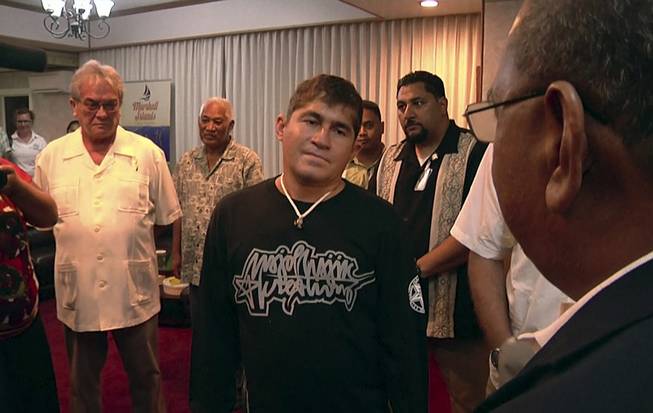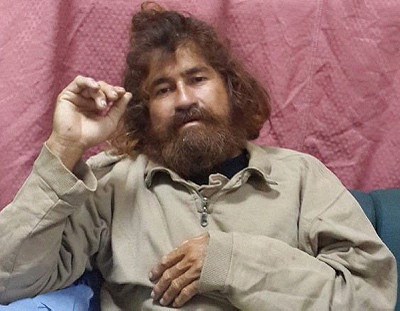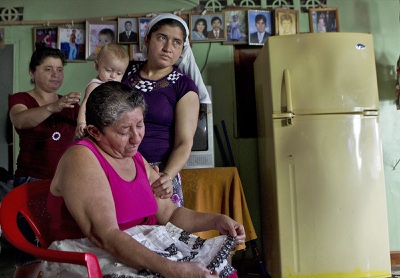
AP Photo/AP Video
In this video image taken from AP video, Jose Salvador Alvarenga, center, a Salvadoran man who says he drifted in an open boat across the Pacific for more than a year, bids farewell to Marshall Islands President Christopher Loeak, right, before flying home at an airport in Majuro, Marshall Islands Monday, Feb. 10, 2014.
Tuesday, Feb. 11, 2014 | 6:33 p.m.

In this Monday, Feb. 3, 2014, photo provided by the Marshall Islands Foreign Affairs Department, a man identifying himself as 37-year-old Jose Salvador Alvarenga sits on a couch in Majuro in the Marshall Islands, after he was rescued from being washed ashore on the tiny atoll of Ebon in the Pacific Ocean.
SAN SALVADOR, El Salvador — Jose Salvador Alvarenga returned late Tuesday to the place where he learned to love the sea, bringing with him a fish tale for the ages.
The 37-year-old, who says he survived more than a year on a small boat drifting from Mexico across the Pacific Ocean to the Marshall Islands, arrived in his native El Salvador to a media throng, a daughter who didn't remember him and a mother who thought he was dead.
He was quickly taken to a VIP lounge where he was met by Salvadoran officials, including the foreign minister and an assistant secretary of health.
"I'm so happy to know he's alive, that he returned. I want to give him a hug," said Emma Alvarenga, an aunt who arrived at the airport to see him but was left with the crush of more than 100 mostly foreign journalists waiting for a news conference.
Alvarenga's story stunned the world when he washed up on the Ebon atoll almost two weeks ago, appearing robust and barely sunburned after more than a year at sea. But he had started out a much larger man, and turned out to be swollen and in pain from the ordeal, suffering from dehydration.
His journey home after a week of rest and medical treatment in Majuro was marked by long layovers in Honolulu and Los Angeles, where doctors checked his health and ability to continue the trip.
His father, Jose Ricardo Orellana, 65, who owns a store and flour mill in the seaside Salvadoran town of Garita Palmera, said his son first went to sea at age 14. "The sea was his thing," Orellana said.
Maria Julia Alvarenga, 59, said her son always had unusual strength and resilience.
His 14-year-old daughter, Fatima, made an archway of palms for the front door of the family home and a sign: "Welcome." She didn't remember ever seeing her father, who left El Salvador to fish in Mexico when she was just over a year old.
Dozens of international journalists camped outside the family's green, brick complex with a ceramic floor about 10 blocks from the sea in an otherwise poor fishing village.
"I haven't seen him for eight years. We're friends, we fished together," said Hector Antonio Zuniga, 39, who said he was dropping his nephew off at the airport and decided to wait and greet Alvarenga.
Alvarenga's incredible tale of drifting across 6,500 miles (10,500 kilometers) of open ocean, eating raw fish, turtles and drinking bird blood to survive initially left many skeptics. But experts said it would be humanly possible for him to survive.
Over several days, details emerged that seemed to corroborate the horrible journey.
Alvarenga said he worked in a fishing village on the Pacific coast of Mexico's southern Chiapas state, where he embarked. A man with his nickname, "Cirilo," had been registered as missing with civil defense officials there. They said a small fishing boat carrying two men, the other named Ezequiel Cordoba, disappeared during bad weather on Nov. 17, 2012, and no trace of them or the craft was found during an intense two-week search.
Cordoba died after about a month when he couldn't eat the raw fish and turtles, Alvarenga said.
Photos from the Marshall Islands published by Britain's Telegraph newspaper showed the boat that Alvarenga purportedly arrived in. It bore the hand-lettered name of a Chiapas fishing cooperative, Camaroneros de la Costa, for which Alvarenga said he worked for in the Costa Azul near Tonala.
The photos also showed a large plastic cooler that Alvarenga purportedly used to shelter himself from the sun and sea.


Join the Discussion:
Check this out for a full explanation of our conversion to the LiveFyre commenting system and instructions on how to sign up for an account.
Full comments policy